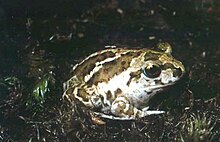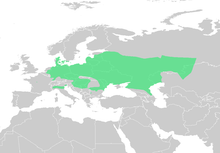Pelobates fuscus
| Pelobates fuscus Temporal range: Lower Oligocene–Recent,[1] | |
|---|---|

| |
| Pelobates fuscus fuscus | |

| |
| Pelobates fuscus insubricus | |
| Scientific classification | |
| Domain: | Eukaryota |
| Kingdom: | Animalia |
| Phylum: | Chordata |
| Class: | Amphibia |
| Order: | Anura |
| Family: | Pelobatidae |
| Genus: | Pelobates |
| Species: | P. fuscus |
| Binomial name | |
| Pelobates fuscus (Laurenti, 1768) | |
| Subspecies | |
|
P. fuscus fuscus | |

| |
| Synonyms[3] | |
| |

Pelobates fuscus is a species of toad in the family Pelobatidae, native to an area extending from Central Europe to Western Asia. It is commonly known as the common spadefoot, garlic toad, the common spadefoot toad and the European common spadefoot.
The common spadefoot grows to a length of approximately 6.5 centimetres (2.6 in) for males and 8 centimetres (3.1 in) for females. The skin colouration varies depending upon habitat, gender and region, but is usually light-grey to beige-brown on the dorsal surface. The skin is mottled by darker marks that differ between individuals. The belly is white, sometimes with grey mottling. Albino specimens have been observed.
Two subspecies are traditionally recognised: Pelobates fuscus fuscus (from central Europe) and Pelobates fuscus insubricus (from Northern Italy). In reality there is no physical or behavioural character allowing to distinguish these supposed subspecies. A recent study showed that there is no haplotype segregation for the populations of Northern Italy, that, therefore, are not to be ascribed to a different subspecies.[4] Haplotypes from some Northern Italian valleys are very characteristic and support a different conception in terms of conservation: not for a different taxonomic position but, instead, for a peculiar differentiation. Populations from eastern Europe appear sufficiently different that they may warrant a separate species status (Pelobates vespertinus).
When alarmed, it emits a very loud call (alarm call) and it can exude a noxious secretion which smells like garlic, hence its common name.
Locations
Pelobates fuscus are seen in the Posavina region. The first findings of tadpoles and the reproductive site of the common spadefoot toad in Bosnia and Herzegovina. In Croatia, this species is found along the Mura, Drava and Sava rivers.[5] In Lombardy this species is widespread in the Ticino river in Parco naturale lombardo della Valle del Ticino.[6]
References
- ^ Martín, C. & Sanchiz, B. (2014). "Pelobates fuscus (Laurenti, 1768)". Lisanfos KMS. Version 1.2. Online reference accessible at http://www.lisanfos.mncn.csic.es/. Museo Nacional de Ciencias Naturales, MNCN-CSIC, Madrid (Spain). Archived from the original on 4 March 2014. Retrieved 3 March 2014.
{{cite web}}: External link in|work= - ^ Aram Agasyan; Aziz Avisi; Boris Tuniyev; Jelka Crnobrnja Isailovic; Petros Lymberakis; Claes Andrén; Dan Cogalniceanu; John Wilkinson; Natalia Ananjeva; Nazan Üzüm; et al. (2009). "Pelobates fuscus". The IUCN Red List of Threatened Species. 2009. IUCN: e.T16498A5951455. doi:10.2305/IUCN.UK.2009.RLTS.T16498A5951455.en.
- ^ Darrel Frost. "Pelobates fuscus". Amphibian Species of the World 6.0, an Online Reference. The American Museum of Natural History. Retrieved October 2, 2019.
- ^ Angelica Crottini & Franco Andreone (2007). "Conservazione di un anfibio iconico: lo status di Pelobates fuscus in Italia e linee guida d'azione" (PDF). Quad. Staz. Ecol. Civ. Mus. St. Nat. Ferrara. 17: 67–76.
- ^ Ćurić, Ana; Adnan, Zimić; Bogdanović, Tomislav; Jelić, Dušan (June 2018). "New data and distribution of common spadefoot toad Pelobates Fuscus (Laurenti, 1768) (Anura: Pelobatidae) in Western Balkans". North-Western Journal of Zoology. 14 (1): 50–59.
- ^ Giovannini, Andrea; Seglie, Daniele; Giacoma, Cristina (2014). ""Identifying priority areas for conservation of spadefoot toad, Pelobates fuscus insubricus using a maximum entropy approach". Biodiversity and Conservation. 23 (6): 1427–1439. Bibcode:2014BiCon..23.1427G. doi:10.1007/s10531-014-0674-x. ISSN 0960-3115.

